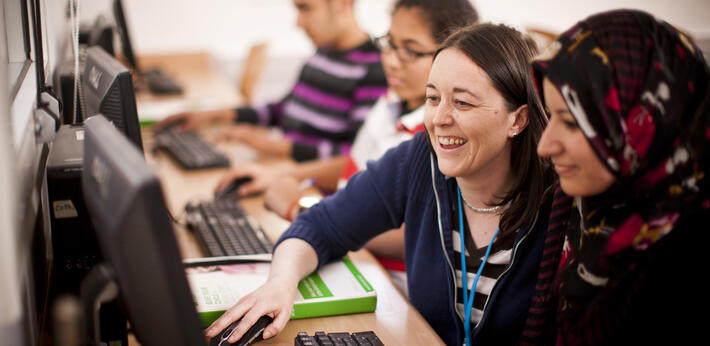You are here
Home ›30/09/2020
Europe - Covid-19 update - 30 September 2020
Since early April, we have been running this update on how education systems in the EU Europe region are responding to the Covid-19 pandemic. We focus on how different countries are dealing with the challenges that the virus has placed on schools and universities, including how they are managing school leavers' and university entry examinations, and the different country contexts across Europe. For more information, updates, webinars and other engagement opportunities, please see ‘Europe and education: Stay connected during Covid-19’.
We focus on ten priority countries: Bulgaria, Cyprus, France, Germany, Greece, Italy, Ireland, Poland, Romania and Spain. This week: France, Germany and Ireland.
- Germany: Abitur results on par or slightly higher than previous years
- Ireland: QQI report on effectiveness of response to education provision during the Covid-19 pandemic 'impressed by the success of higher education institutions'.
If a country you’re interested in doesn’t appear here, or if you would like more details, please check past updates or contact the country representative.
We have restarted English examinations in 30 countries in Europe. For the latest update by country, please check: https://www.ielts.org/news/2020/changes-to-ielts-test-arrangements-in-some-locations-due-to-novel-coronavirus.
If you have any feedback, please contact me or any of the country staff listed below.
Thank you - and stay safe.
Almut Caspary – Higher Education and Research Lead, EU Europe (Almut.Caspary@britishcouncil.org).
Updated 28 September
Important note: Education in Germany is largely devolved to the 16 federal states. This means that although there are agreed Germany-wide principles, there are differences in dates of exams, holidays and regulations for schools and higher education institutions. Public health measures are also in the hands of state governments and local authorities, creating a mixed picture across the country as lockdown restrictions are eased at different paces depending on local case numbers and the severity of infections.
Some urban centres and other areas have seen a recent increase in infections, although overall indicators (e.g. no more than 50 infections per 100,000 inhabitants) are still being met in most places and overall ratios are lower than in other European nations. Locally, new measures have been introduced where the 50 infections per 100,000 inhabitants threshold has been passed, e.g. face coverings must now be worn outside in certain parts of Munich. More regions have been added to a list of 'risk zones' which come with mandatory quarantine after return (e.g. large parts of Austria). Germany’s blanket travel warning for most of the world except countries in Europe and a few others deemed 'safe' will be lifted at the end of this month. From 1 October warnings will be issued for specific countries or regions on a case-by-case basis according to factors such as infection numbers. Free Covid-19 tests are no longer offered at airports to people returning from high risk countries. Germany's contact-tracing 'Corona-Warn-App' has been downloaded 18 million times as of the end of September.
Schools and universities
All schools are back to face-to-face teaching. The 16 states have agreed to this as long as the number of infections is low, with measures in place to keep new infections to a minimum. In most states, physical distancing has been suspended in classrooms, although it is required in other parts of the school, while in others, use of face masks is mandatory in classrooms as well.
With the rise in the number of infections there have been isolated local school closures with groups of school students and teachers self-isolating or in quarantine.
All states have plans in place to continue lessons should infection numbers rise beyond an acceptable limit. A return to full online provision is the 'worst-case scenario' in a series of action levels, with intermediate steps including reduced class sizes with classes rotating between remote and in-person schooling.
University admissions for the 2020-21 intake are in process. Most universities are cautious and will allow only a limited number of face-to-face activities with strict regulations in place.
Examinations
Abitur (A-level equivalent) grades have been issued in all states. Results are reported as being on par with, and in some cases slightly better than, previous years.
Financial and academic support
The scheme of €500-per-month grants for students struggling financially will end at the end of September and has paid out €60 million to more than 135,000 applicants. 80,000 applications have been rejected. As the student job market has not yet recovered (only a slight increase of student jobs on offer in recent weeks) many students are still facing financial difficulties.
Other insights: UK in the media
There is regular coverage of both Covid-19 numbers and policies in the UK. Brexit is definitely getting more mentions again, and there is extensive reporting of expectations of a no-deal Brexit with time running out. Some media are also covering financial difficulties facing some UK universities due to Covid-19 and lower international student numbers.
Contact
For more information about Germany, please contact Ailsa Kienberger (ailsa.kienberger@britishcouncil.de).
Updated 29 September
Ireland has reintroduced greater restrictions for the Dublin area, including the closure of theatres, cinemas and indoor dining. For third level institutions in Ireland this means most lectures and teaching will take place online where possible, with the exception of small tutorials and laboratory work. All on-campus social and club activities have been suspended, while access to libraries will be subject to strict social distancing protocols and booking systems.
School and university closures
The academic year for third level begins this week for many institutions though first year students will begin slightly later.
Examinations
The next round of third level place will be offered this week.
Student financial support
The question of charges for students this year remains a regularly debated topic, particularly where campus access remains restricted. The increased number of places made available this year at third level will increase financial pressure on institutions.
Remote and online academic provision
An analysis of the effectiveness of remote and online teaching in higher and further education has been released by independent standards body QQI. The report is broadly positive, offering assurance for many HEIs that online and remote learning was successful and providing suggestions and recommendations for future iterations.
For higher education the report concludes: 'Considering what was achieved in such a short time, we were impressed by the success of higher education institutions at finishing out the academic year under the Covid-19 restrictions within the normal timescale and completing the groundwork for next year. The quality assurance infrastructure established by institutions proved to be crucial in approaches to change management, which inspires confidence in the reasonableness of those changes.'
The full report is available here.
British Council activity in Ireland
The British Council in Ireland and the Royal Irish Academy have published a discussion paper on Race, Ethnicity and Change in Higher Education. It is the product of an event early in 2020 which brought together leading thinkers and practitioners for a discussion on ethnicity and race, diversity and inclusion in higher education (HE) in Ireland and the UK.
Although Ireland and the UK's higher education systems are different, there are enough commonalities and shared challenges evident in addressing race and equality to benefit from sharing insight and experience. The British Council’s work in higher education in Ireland connects individuals and organisations from the UK and Ireland to support mutual learning, enable new ways of working together and find solutions to shared and global challenges.
You can read our summary of the report here, or go straight to the report.
Further information
9thlevel.ie – Updated digest of articles related to HE in Ireland updated very regularly. Also includes articles with a Northern Ireland focus.
Contact
For more information about Ireland, please contact Mags Walsh (mags.walsh@ie.britishcouncil.org).
- Bulgaria: Ivaylo.Slavov@britishcouncil.bg
- Cyprus: pantelitsa.michael@cy.britishcouncil.org
- France: Catherine.Saracco@britishcouncil.fr
- Germany: ailsa.kienberger@britishcouncil.de
- Greece: Maria.Tsakali@britishcouncil.gr
- Italy: Filomena.Casamassa@BritishCouncil.it
- Ireland: Mags.Walsh@ie.britishcouncil.org
- Poland: Julia.Plachecka@britishcouncil.pl
- Romania: gabriel.ivan@britishcouncil.ro
- Spain: Carolina.Jimenez@britishcouncil.es
- 16 September: France, Germany, Ireland
- 9 September: France, Ireland, Romania
- 2 September: France, Germany, Greece, Italy, Spain
- 28 July: Bulgaria, France, Germany, Italy, Romania, Spain
- 8 July: France, Germany, Italy, Romania
- 1 July: Germany, Greece, Ireland, Romania
- 24 June: Bulgaria, Cyprus, Germany, France, Romania, Spain
- 10 June: France, Germany, Ireland, Romania, Spain
- 3 June: France, Germany, Greece, Ireland, Italy, Romania
- 27 May: France, Germany, Ireland, Italy, Romania, Spain
- 20 May: Bulgaria, Cyprus, Germany, Greece, Ireland, Poland, Romania, Spain
- 13 May: Cyprus, France, Germany, Italy, Ireland, Romania, Spain
- 6 May: Bulgaria, Cyprus, France, Germany, Greece, Romania
- 29 April: Cyprus, France, Germany, Greece, Italy, Poland, Romania
- 22 April: Germany, Greece, Spain
- 16 April: Bulgaria, Cyprus, France, Romania
- 8 April: Bulgaria, Cyprus, France, Greece, Italy, Poland, Romania, Spain






